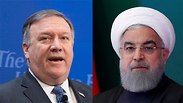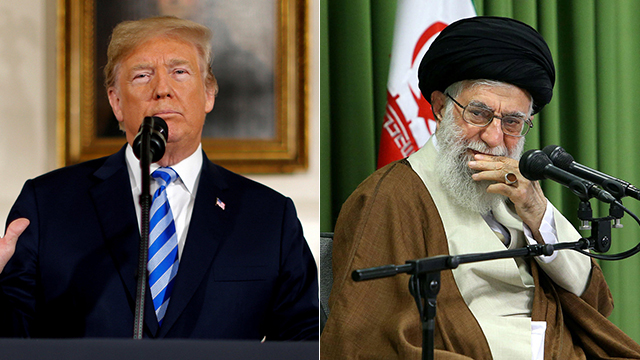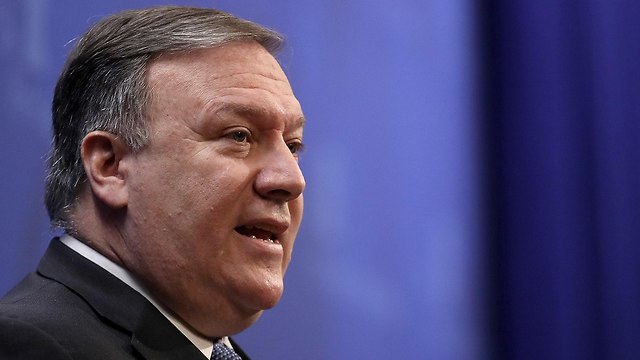

US to 'fully enforce' Iran sactions reimposed this week
First set of US sanctions to take effect again Monday, targeting Iran's automotive sector, gold and other metals; second batch of sanctions targeting oil sector and central bank will be re-imposed in early November; 'We are happy to talk if there's an arrangement that is appropriate, but there's no evidence today of a change in their behavior,' says Pompeo.
The United States intends to fully enforce sanctions due to be reimposed against Iran early this week on orders from US President Donald Trump, Secretary of State Mike Pompeo said on Sunday.
A first set of US sanctions that had been eased by the Obama administration under the terms of the landmark 2015 Iran nuclear deal will take effect again on Monday. Those sanctions target Iran's automotive sector as well as gold and other metals.
The US also has banned imports of Iranian products such as carpets and pistachios and revoked licenses that allowed Iran to purchase US and European aircraft. Iran acquired five new European commercial planes on Sunday before the sales were cut off.
The last and most significant sanctions—those on Iran's oil sector and central bank—will be restored on Nov. 4. Iranian oil sales are a crucial source of hard currency.
Pompeo, speaking with reporters returning with him from an Asian trip, said the White House would detail implementation of the measures on Monday morning.
"It's an important part of our efforts to push back against Iranian malign activity," he said. "The United States is going to enforce these sanctions."
Despite opposition from European allies, Trump in May pulled the United States out of a 2015 deal between world powers and Tehran under which international sanctions were lifted in return for curbs on Iran's nuclear program.
Trump had denounced the deal reached under his White House predecessor, Barack Obama, as one-sided in Iran's favor.
Starting this week, Washington will reimpose sanctions on Iran's purchases of US dollars, its trade in gold and precious metals, and its dealings with metals, coal and industrial-related software.
The United States has told other countries they must halt imports of Iranian oil starting in early November or face US financial measures.
Iranian President Hassan Rouhani said last week that Trump's repudiation of the deal was illegal and Iran would not yield to Washington's renewed campaign to strangle Iran's vital oil exports.
Iran will ease foreign exchange rules, state TV reported on Sunday, in a bid to halt a collapse of the rial currency, which has lost half its value since April due to fears about the return of US sanctions.
Referring to recent sporadic protests in Iranian cities , Pompeo said: "The Iranian people are not happy—not with the Americans but with their own leadership. They're unhappy with the failure of their own leadership to deliver the economic promises that their leadership promised them."
Pompeo said the United States wants "the Iranian people to have a strong voice of who their leadership will be," although he stopped short of calling for regime change in Tehran.
He later said in a message on Twitter that the United States was "deeply concerned about reports of Iranian regime's violence against unarmed citizens" and urged respect for human rights.
Protests broke out on Sunday for a sixth night in Iranian cities, including Kazeroon in the south, according to social media. Authorities reported the first fatality among protesters, with the shooting of a man in Karaj, west of Tehran. But they denied security forces were involved, Iranian news agencies reportedThe protests have often begun with slogans against the high cost of living and alleged financial corruption but quickly turned into anti-government rallies.
Pompeo said Monday's re-imposition of sanctions is an important pillar in US policy toward Iran. He said the Trump administration is open to looking beyond sanctions but that would "require enormous change" from Tehran. "They have got to behave like a normal country," he said, describing Iranian leaders as "bad actors."
He alluded to Trump's suggestion last week of the potential for future negotiations with Tehran, a notion that senior Iranian officials quickly rejected.
"We are happy to talk if there's an arrangement that is appropriate, that could lead to a good outcome," he said.
Pompeo noted that the US has long designated Iran as the world's foremost state sponsor of terrorism and said it cannot expect to be treated as an equal in the international community until it halts such activities.
"Perhaps that will be the path the Iranians choose to go down," he said. "But there's no evidence today of a change in their behavior."
The Associated Press contributed to this report.

















